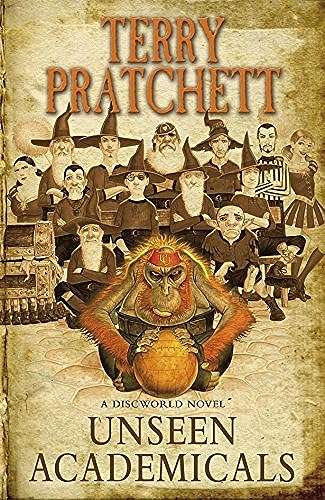
Unseen Academicals by Terry Pratchett -hardcover
Check my rate
| Main centres: | 1-3 business days |
| Regional areas: | 3-4 business days |
| Remote areas: | 3-5 business days |

| Main centres: | 1-3 business days |
| Regional areas: | 3-4 business days |
| Remote areas: | 3-5 business days |
Published by Doubleday, 2009, hardcover, 400 pages, condition: new.
Football has come to the ancient city of Ankh-Morpork - not the old-fashioned, grubby pushing and shoving, but the new, fast football with pointy hats for goalposts and balls that go going. And now the wizards of Unseen University must win a football match without using magic, so they're going to try everything else.
The Big Match draws in an urchin with a gift for kicking a tin can, a maker of jolly good pies, a dim but beautiful young woman, who might turn out to be the greatest fashion model ever, and the mysterious Mr Nutt. (No one knows much about Mr Nutt, not even Mr Nutt).
As the match approaches, four lives are changed forever. Because the thing about football - the important thing about football - is that it is not just about football.
Here we go! Here we go! Here we go!
Sir Terence David John Pratchett was an English author, humorist, and satirist, best known for the Discworld series of 41 comic fantasy novels published between 19832015, and for the apocalyptic comedy novel Good Omens (1990), which he co-wrote with .
Pratchett's first novel, The Carpet People, was published in 1971. The first Discworld novel, The Colour of Magic, was published in 1983, after which Pratchett wrote an average of two books a year. The final Discworld novel, The Shepherd's Crown, was published in August 2015, five months after his death.
With more than 100 million books sold worldwide in 43 languages, Pratchett was the UK's best-selling author of the 1990s. He was appointed an Officer of the Order of the British Empire (OBE) in 1998 and was knighted for services to literature in the 2009 New Year Honours. In 2001 he won the annual Carnegie Medal for The Amazing Maurice and His Educated Rodents, the first Discworld book marketed for children. He received the World Fantasy Award for Life Achievement in 2010.
In December 2007 Pratchett announced that he had been diagnosed with early-onset Alzheimer's disease. He later made a substantial public donation to the Alzheimer's Research Trust (now Alzheimer's Research UK, ARUK), filmed three television programmes chronicling his experiences with the condition for the BBC, and became a patron of ARUK. Pratchett died on 12 March 2015, at the age of 66.